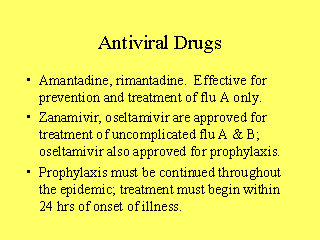 |
Both amantadine and rimantadine as well as oseltamivir are about 60-90%
effective in preventing influenza A infection. Oseltamivir is also effective in
preventing influenza B. Amantadine and rimantadine, when given within 48 hours
from the onset of illness can reduce the severity and duration of influenza A
illness by about one day. The propensity of zanamivir and oseltamivir in
reducing the severity of influenza A and B illness is also about one day. Both
amantadine and rimantadine may cause CNS and GI side effects. Amantadine has
been associated with more frequent CNS adverse reactions than rimantadine. Both
drugs are excreted in the kidney. Therefore, special precautions should be taken
in giving these drugs to persons with decreased renal function. Since zanamivir
is taken by inhalation, it should not be given to persons with underlying airway
disease. The primary side effect of oseltamivir is nausea and vomiting; thus it
should taken with food.

|
Go to Comment Form
|
|